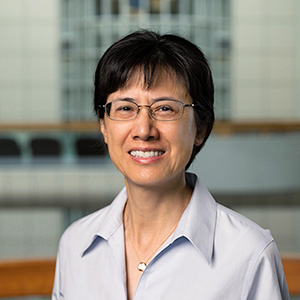Source: Interfolio F180

Xiaohua Wu, PhD
Research Focus
DNA double-strand break repair and cell cycle checkpoints in mammalian cells.
Gross chromosomal arrangements (GCRs) are hall markers of cancer cells, and DNA double-stand breaks (DSBs) are the major cause of cancer-associated genome instability. Unrepaired DSBs can lead to chromosomal breakage and cell death, while incorrectly repaired DSBs would lead to genome instability. The research interest of my laboratory is to understand the molecular mechanisms underlying the function of DNA damage checkpoint and DSB repair to maintain genome stability and prevent cancer and aging. We have established novel EGFP-based DSB repair assays and chromosomal translocation mouse models to investigate the mechanisms underlying DSB repair and chromosomal rearrangement. We are also interested in understanding the role of the breast cancer suppressor BRCA1, and other disease-linked and genome-stability maintenance genes, such as Nbs1, Mre11 and CtIP, in the maintenance of genome stability.
Education
Postdoctoral (Molecular Biology), Dana-Farber Cancer Institute and Harvard Medical School, 2001Ph.D. (Biology), Brandeis University, Waltham, MA, 1995
B.S. (Genetics and Bioengineering), Fundan University, 1987
Professional Experience
2023-present Professor, Molecular & Cellular Biology, Scripps Research2017-2023 Professor, Molecular Medicine, Scripps Research
2007-2017 Associate Professor, Molecular and Experimental Medicine (MEM), Scripps Research
2002-2007 Assistant Professor, Molecular and Experimental Medicine (MEM), Scripps Research
1996-2001 Postdoctoral Associate with Dr. David M. Livingston, Dana-Farber Cancer Institute
1996-2001 Postdoctoral Associate with Dr. David M. Livingston, Harvard Medical School, Harvard University
1995-1996 Postdoctoral Fellow, Brandeis University
Awards & Professional Activities
2009 Reviewer for NIH Challenge Grants in Health and Science Research2014 Ad hoc member, NIH Scientific Review Group: RTB, National Institutes of Health
2016 Ad hoc member, NIH Scientific Review Group: CE, National Institutes of Health
2018 Reviewer, NIH Director's Early Independence Award, National Institutes of Health
2018 Reviewer, Wellcome Trust, UK
2016 Member, Editorial Board of Journal of Biological Chemistry (JBC)
2015 Co-organizer, SoCal Genome Stability Symposium, Duarte, CA, City of Hope
2018 Co-organizer, SoCal Genome Stability Symposium, Duarte, CA, City of Hope
2016 Co-organizer, SoCal Genome Stability Symposium, La Jolla, CA, The Scripps Research Institute
2017 Co-organizer, SoCal Genome Stability Symposium, Los Angeles, CA, University of California
2014 Organizer, TSRI Cell Cycle Meetings, The Scripps Research Institute
2009 TSRI Graduate School Admission Committee, Member
2008 TSRI Radiation Safety Committee
2017 TSRI Faculty Tenure and Promotion Committee, Ad hoc member
2017 TSRI Molecular Medicine Seminar Committee Members
1996 Awarded Postdoctoral Fellowship, Jane Coffin Childs Memorial Fund for Medical Research
1996 Awarded Postdoctoral Fellowship, The Helen Hay Whitney Foundation (Declined)
1996 Awarded Postdoctoral Fellowship, Leukemia & Lymphoma Society (Declined)
2004 Ellison New Scholar in Aging, The Ellison Medical Foundation
2009 Awarded IDEA grant, CA Breast Cancer Research Program
2009 Pilot/Methodological Study Award, Scripps Translational Science Institute (STSI)
2017 Awarded IDEA grant, CA Breast Cancer Research Program
2016 The Elkin Lecture Speaker, Emory University
2018 The BEI Shizhang Lecture Speaker, China, Institute of Biophysics
Selected Publications
Wang, H.; Li, Y.; Truong, L. N.; Shi, L. Z.; Hwang, P. Y.; He, J.; Do, J.; Cho, M. J.; Li, H.; Negrete, A.; Shiloach, J.; Berns, M. W.; Shen, B.; Chen, L.; Wu, Xiaohua CtIP maintains stability at common fragile sites and inverted repeats by end resection-independent endonuclease activity. Molecular Cell 2014, 54, 1012-1021.
[View]
Truong, L. N.; Li, Y.; Shi, L. Z.; Hwang, P. Y.; He, J.; Wang, H.; Razavian, N.; Berns, M. W.; Wu, Xiaohua Microhomology-mediated end joining and homologous recombination share the initial end resection step to repair DNA double-strand breaks in mammalian cells. Proceedings of the National Academy of Sciences of the United States of America 2013, 110, 7720-7725.
[View]
Wang, Hailong; Shi, Linda Z.; Wong, Catherine C L C.; Han, Xuemei; Hwang, Patt Y.; Truong, La N.; Zhu, Qingyuan; Shao, Zhengping; Chen, David J.; Berns, Michael W.; Yates, John R.; Chen, Longchuan; Wu, Xiaohua The interaction of CtIP and Nbs1 connects CDK and ATM to regulate HR-mediated double-strand break repair. 2013, 9, e1003277.
Olson, Erin; Nievera, Christian J.; Liu, Enbo; Lee, Alan Y.; Chen, Longchuan; Wu, Xiaohua The Mre11 complex mediates the S-phase checkpoint through an interaction with replication protein A. 2007, 27, 6053-67.

